Breadcrumbs
Dené Artisan Maria Rose Sikyea is exploring natural plant dyes for caribou hair
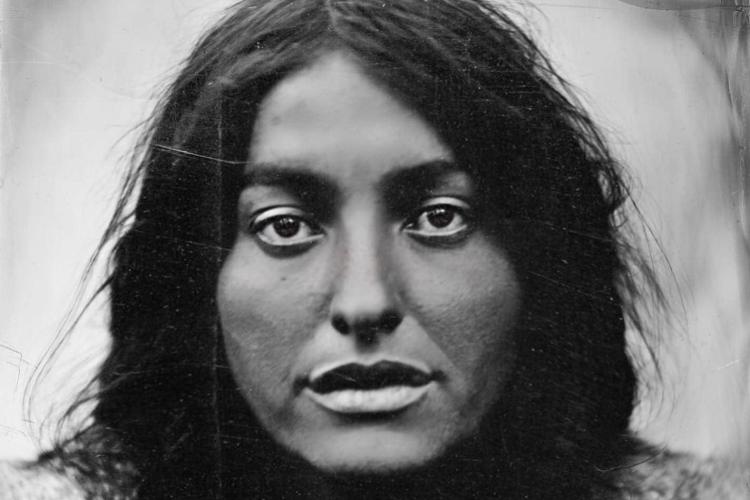
Maria Rose Sikyea is a Dené artisan from Northwest Territories who facilitates traditional skills workshops, sells caribou hair bundles, works towards cultural revitalization and creates jewelry alive with the gifts of Mother Earth.
When caribou graze among saxifrages – a vibrant high arctic flower found on the tundra – their muzzles become naturally coloured with a reddish hue. This natural occurrence is what inspired Maria to name her new innovation, Saxi Yukon.
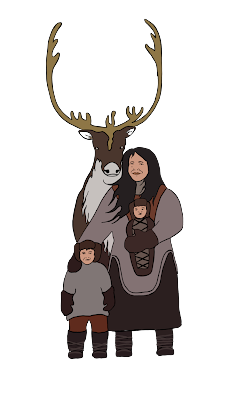
Maria Rose was researching natural colouring materials in the Northern Territories to colour caribou hair when she discovered this natural occurrence, which happens during caribou calving season – an event that spoke to her deep connection to caribou and their cycles. “I felt it was a beautiful rebirth story of cultural revitalization directly on the land with the caribou,” she shared. This story gives the name for Saxi Yukon, a branch of Maria Rose’s business Caribou Woman Creations. Maria strives for revitalization in both the learnings of her Dené ancestral skills and sharings stemming from her ancestry.
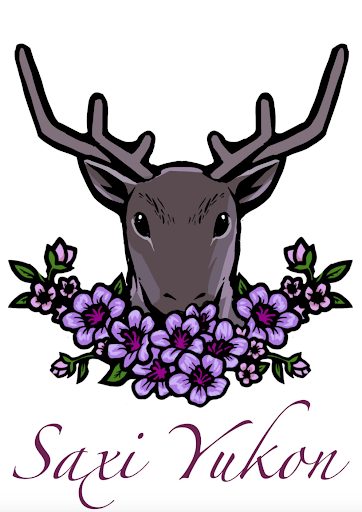 Maria Rose has been intentionally exploring the use of natural colours abounding in Mother Nature to dye caribou hair for jewelry - while also making and creating her “full set of clothing and tools circa 1930s”. While she is conscious and aware of the waste produced from dying caribou hair with artificial pigments, Maria wanted to offer a cleaner, more natural product for customers that would be more gentle on the Earth.
Maria Rose has been intentionally exploring the use of natural colours abounding in Mother Nature to dye caribou hair for jewelry - while also making and creating her “full set of clothing and tools circa 1930s”. While she is conscious and aware of the waste produced from dying caribou hair with artificial pigments, Maria wanted to offer a cleaner, more natural product for customers that would be more gentle on the Earth.
Her work is alive with her family's deep-rooted connection to the land and to their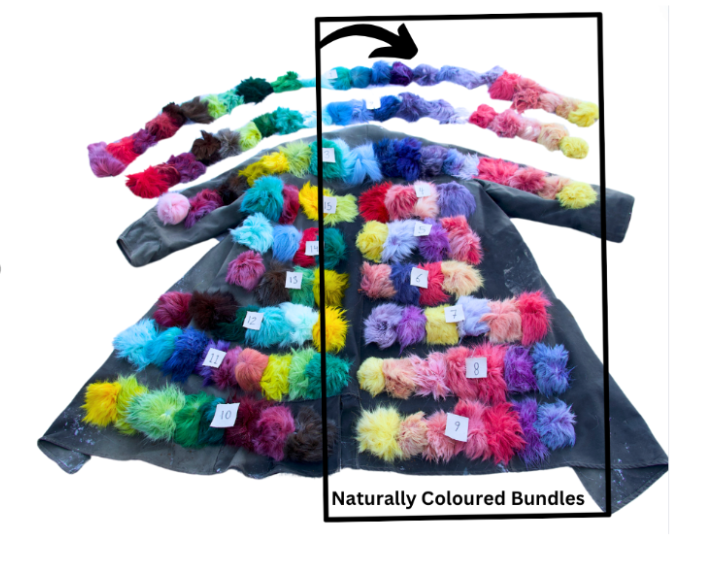 Dené traditions. Grounding from traditional knowledge, while embracing creative innovation, Maria Rose shared, “my relationship to exploring the natural world is through experience; and that brings me back to the incredible innovation of our ancestors. It's incredible what can be found through curious exploration of our incredible Mother Earth and all her gifts she so graciously gives us in our everyday lives, if we are open to seeing the beauty within our natural world abound. For example, we may have a calling to get to know a plant, and through that calling, we learn the magic through time, place and process.”
Dené traditions. Grounding from traditional knowledge, while embracing creative innovation, Maria Rose shared, “my relationship to exploring the natural world is through experience; and that brings me back to the incredible innovation of our ancestors. It's incredible what can be found through curious exploration of our incredible Mother Earth and all her gifts she so graciously gives us in our everyday lives, if we are open to seeing the beauty within our natural world abound. For example, we may have a calling to get to know a plant, and through that calling, we learn the magic through time, place and process.”
With funding support from I&E’s Innovation Fund, she tested a number of plants for their colouring capabilities, including onion skin, osage, sumac, marigold, goldendock, usnea, cochineal and several others. One of her favourite materials to work with is logwood, producing a purple pigment which is historically challenging to achieve and due to its challenge used to be a symbol of importance.
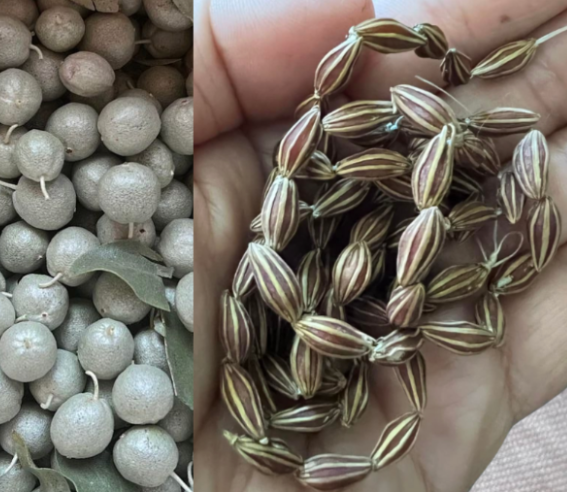 Some of her findings include the diversity of colours according to the seasons, and fresh versus dry materials. For instance, an Elder shared how fresh aspen leaves in spring make green, whereas dried leaves create a rusted colour. Meanwhile, a berry used in Athabascan Dené regalia, commonly known as Wolf Willow or Silverberries and Kaip’ine in one of her traditional languages, produces a beautiful array of results according to what time of the season it is harvested, and has a transformative result depending if it is boiled versus soaked. This plant use has been revived after being “asleep” like many other Indigenous traditions that have been rebirthing within this century.
Some of her findings include the diversity of colours according to the seasons, and fresh versus dry materials. For instance, an Elder shared how fresh aspen leaves in spring make green, whereas dried leaves create a rusted colour. Meanwhile, a berry used in Athabascan Dené regalia, commonly known as Wolf Willow or Silverberries and Kaip’ine in one of her traditional languages, produces a beautiful array of results according to what time of the season it is harvested, and has a transformative result depending if it is boiled versus soaked. This plant use has been revived after being “asleep” like many other Indigenous traditions that have been rebirthing within this century.
Along with harvesting materials and crafting jewelry, working on her bigger project and focusing on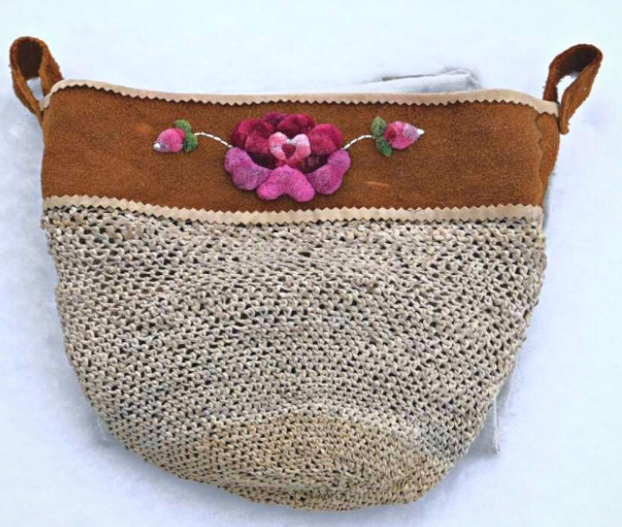 cultural revitalization, Maria Rose teaches a variety of workshops to Indigenous Youth, Elders, and non-Indigenous people. She finds tufting in particular encourages a quiet state of mind and a sense of healing for participants. Her current traditional skill focus is continuing to challenge herself with “Porcupine Quill Bow Loom Weaving” which is also a traditional Dené skill that has been asleep since the 1900s. Her teacher Arsene Bitsidea told her once she is able to do 28 string weaving of quills she would be considered to have mastered the skill. Her goal for this year is to colour enough porcupine quills with natural pigments from the land to then create a babiche bag (A Dené hunting bag with woven strips of caribou hide) with a large panel of the loomed quills, which is something her great-grandmother used to make.
cultural revitalization, Maria Rose teaches a variety of workshops to Indigenous Youth, Elders, and non-Indigenous people. She finds tufting in particular encourages a quiet state of mind and a sense of healing for participants. Her current traditional skill focus is continuing to challenge herself with “Porcupine Quill Bow Loom Weaving” which is also a traditional Dené skill that has been asleep since the 1900s. Her teacher Arsene Bitsidea told her once she is able to do 28 string weaving of quills she would be considered to have mastered the skill. Her goal for this year is to colour enough porcupine quills with natural pigments from the land to then create a babiche bag (A Dené hunting bag with woven strips of caribou hide) with a large panel of the loomed quills, which is something her great-grandmother used to make.
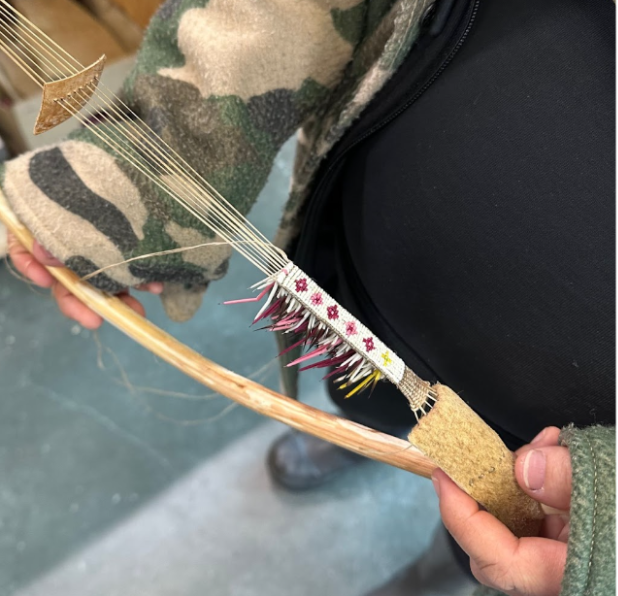 “Learning to work with pigments to naturally colour caribou hair, inspired me to be able to only use natural pigments in my long term circa 1930s project of creating the full set of clothing for my family of five. This feels like something that hasn’t happened in a long time and the innovation of learning the ways of the ancestors in our modern life, has me seeing the environment around in a whole new light and curious about the many possibilities.”
“Learning to work with pigments to naturally colour caribou hair, inspired me to be able to only use natural pigments in my long term circa 1930s project of creating the full set of clothing for my family of five. This feels like something that hasn’t happened in a long time and the innovation of learning the ways of the ancestors in our modern life, has me seeing the environment around in a whole new light and curious about the many possibilities.”
Over the years, Maria Rose has developed her entrepreneurial and storytelling skills through Yukonstruct’s programming, as well as completing the Inspire program and furthering her skills through her creative exploration and conducting works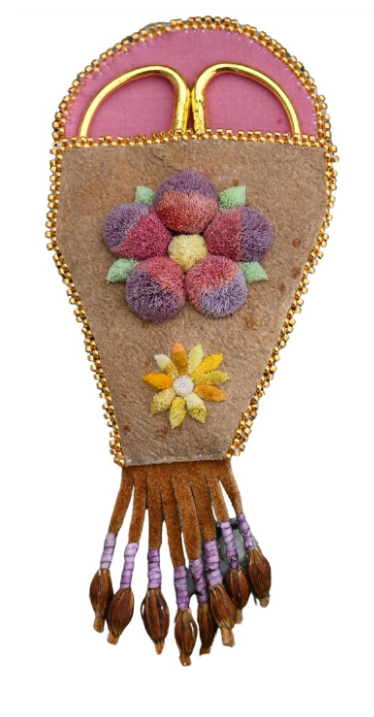 hops.
hops.
For Maria Rose, her work brings “a sense of belonging and worthiness. It’s the key to being open to possibilities, to being fearless with one's ideas, taking action, and making connections with our ancestral knowledge to bring into the future of tomorrow's world.” Maria Rose sees opportunities for more Indigenous women to confidently come up with ideas, to move forward with their passions and provide opportunities for their families and a community as a whole.
Learn more about Caribou Woman Creations and Saxi Yukon.
Learn more about how YukonU I&E’s programs can support you to grow your business ideas from anywhere in the Yukon: YukonU.ca/innovation
Photos: Maria Rose Sikyea